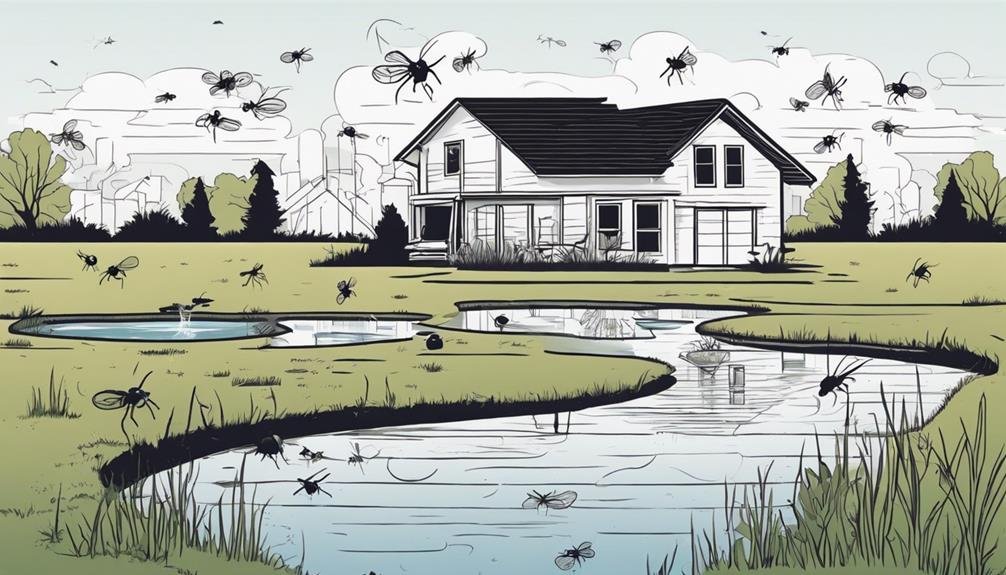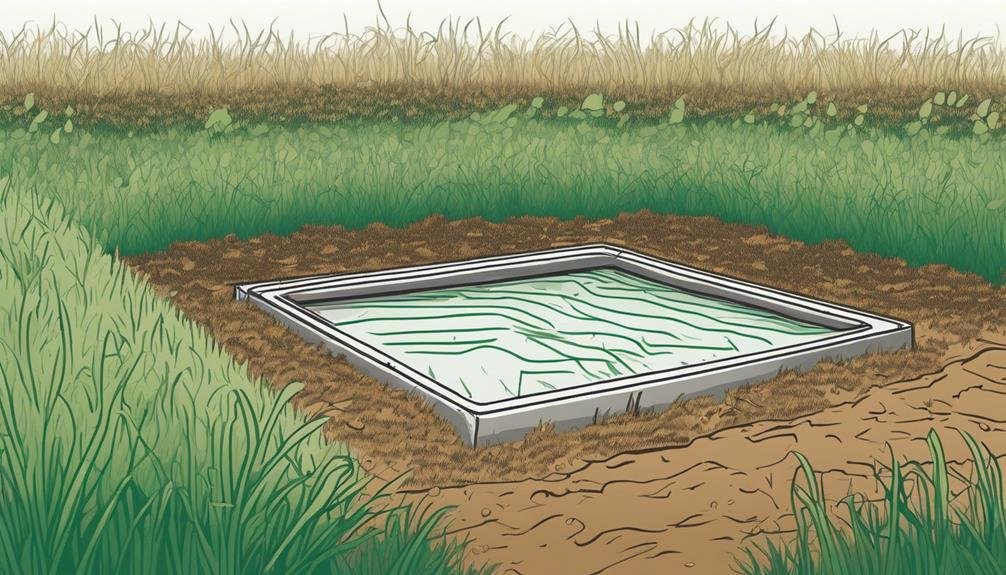Have you ever wondered if that persistent foul smell in your yard could be a sign of something more serious?
It's important to pay attention to subtle signs around your property that could be indicating issues with your septic tank.
From slow drains to unusual sounds coming from your plumbing, these indicators might be the key to preventing a major septic system problem.
Key Takeaways
- Unpleasant odors signal potential leaks, clogs, or a full tank.
- Slow drainage indicates clogged pipes in the septic system.
- Lush green patches suggest excess moisture in the drainfield area.
- Gurgling sounds from fixtures may indicate septic system issues.
Unpleasant Odors in and Around Property

If you detect foul smells originating from your septic tank, it often signifies a potential issue that requires prompt attention. Unpleasant odors in and around your property can be a sign of a more severe problem within the septic system. These odors aren't only a nuisance but can also indicate issues such as leaks, clogs, or a full tank.
One critical concern related to foul odors from your septic tank is the risk of soil contamination. When a septic tank malfunctions, untreated wastewater can seep into the surrounding soil, contaminating it with harmful bacteria and other pathogens. This contamination can pose serious health risks to you, your family, and even your neighbors.
To address these odors and prevent further complications like soil contamination and health risks, it's essential to have your septic system inspected and serviced by a professional. Regular maintenance can help detect and resolve issues early, ensuring the proper functioning of your septic tank and the safety of your property and the environment.
Slow Draining Fixtures in the Home
Experiencing slow draining fixtures in your home can indicate potential issues within your septic system that require investigation and timely resolution. Here are four key points to consider:
- Clogged Pipes: Slow drainage may be a result of clogged pipes within your septic system. This can happen due to a buildup of solid waste and debris over time, impeding the flow of water through the pipes.
- Maintenance Tips: Regular maintenance of your septic system is crucial to prevent slow draining fixtures. Schedule routine inspections and pumping to keep the system functioning optimally.
- Professional Inspection: If you notice persistent slow draining in multiple fixtures, it's advisable to seek the expertise of a professional septic tank service provider. They can assess the situation accurately and recommend appropriate solutions.
- Avoid Harsh Chemicals: Refrain from using harsh chemicals or excessive amounts of cleaning agents in your drains. These can contribute to clogs and hinder the proper functioning of your septic system.
Lush Green Patches in Drainfield Area

When observing lush green patches in the drainfield area of your property, it may indicate potential issues with the saturation and proper functioning of your septic system. Soil saturation, caused by a septic system that isn't draining correctly, can lead to excess moisture in the drainfield area. This excess moisture can result in the growth of lush green patches of grass or vegetation. These patches are a sign that the soil in the drainfield isn't absorbing the effluent as it should, which can be due to a buildup of solids in the system or a blockage in the drainfield pipes.
Additionally, root intrusion from nearby trees or shrubs can also contribute to soil saturation issues in the drainfield area. Tree roots seeking moisture and nutrients may infiltrate the septic system pipes, causing blockages and preventing proper drainage. It's essential to address these issues promptly to prevent further damage to your septic system and avoid costly repairs in the future.
Gurgling Sounds From Plumbing Fixtures
To address gurgling sounds emanating from plumbing fixtures, it's crucial to investigate potential issues within your septic system that may be causing this disturbance. When you hear gurgling noises, it could indicate a problem that needs attention to prevent further damage to your septic tank and plumbing system.
Here are some key points to consider:
- Check for Clogs: Inspect your drains for any blockages that could be causing the gurgling sounds.
- Evaluate the Ventilation System: Make sure the vent pipes connected to your plumbing fixtures aren't obstructed or damaged.
- Assess the Septic Tank Levels: Ensure that the septic tank isn't full or experiencing any issues with drainage.
- Consider Professional Inspection: If the gurgling persists, seek the help of a septic system professional to conduct a thorough assessment and provide potential solutions.
For ongoing maintenance, regular septic tank inspections and pumping every 3-5 years can help prevent gurgling sounds and other septic system issues.
Conclusion
In conclusion, it's important to keep a close eye on common indicators of septic tank issues to avoid costly repairs and potential health hazards.
By addressing unpleasant odors, slow draining fixtures, lush green patches in the drainfield area, and gurgling sounds from plumbing fixtures promptly, you can prevent further damage to your septic system.
Stay vigilant and proactive in maintaining your septic tank to ensure it continues to function properly.

